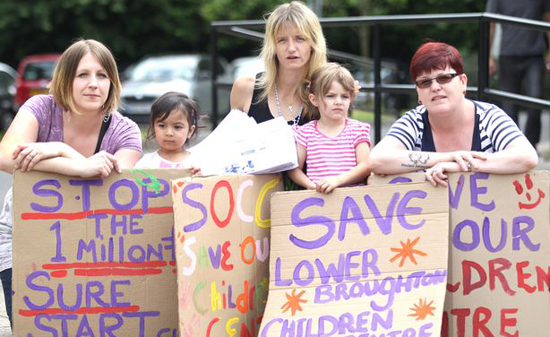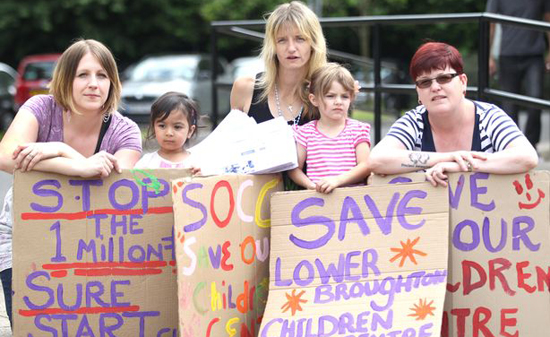
The 2015 July Budget was a savage attack on working class women. In FRFI 244, we reported that of the £26bn cut through tax and benefit reforms since 2010, £22bn has been taken from women – a total of 85%. Women will yet again bear the brunt of austerity. Of the £9.6 billion to be taken from the poorest families, £7 billion – 70% – will come from women. Through it all, the ruling class continues to conjure up a world far from reality. Prime Minister David Cameron presents the Tories as ‘the real party for working people: giving everyone in our country the chance to get on, with the dignity of a job, the pride of a pay cheque, a home of their own and the security and peace of mind that comes from being able to support a family’. He neatly describes the direct opposite of the experience of working class women and families up and down the country.
‘A home of their own’
Families and women will be hit hardest by attacks on housing benefit. From April 2016, a family premium of £17.45 per week will be cut. This is an attack on housing benefit by tightening the means test, essentially claiming that families need less to meet their basic needs. The freeze on housing benefit means unaffordable housing. Housing benefit recipients, half of whom are single women – many of them with children – face trying to find somewhere cheaper to live, forced to leave their community or go without basics. The benefit cap will be even more drastic than the original proposal. Despite finding the cap legal overall, the Supreme Court ruled that it breaches the UK’s obligations under the UN convention on the rights of the child. The Deputy President of the court put it succinctly: ‘Claimants affected by the cap will, by definition, not receive the sums of money which the state deems necessary for them adequately to house, feed, clothe and warm themselves and their children.’ Working class women will further be forced to make impossible choices as to how to meet their basic needs.
‘Being able to support a family’
Changes to tax credits are one of the most severe attacks, affecting benefit claimants and low-paid workers, who make up two-thirds of claimants. £9bn of the £12bn worth of ‘welfare savings’ comes from tax credits, and 90% of child tax credits are paid to women. Working class families face benefit cuts that dictate what their families must look like; from April 2017, families will not receive child tax credits or housing benefit for more than two children. The message that only certain families – such as the Royal family or the Blairs – should be able to have more than two children is clear. Higher payments for these benefits for a first child will also be scrapped. The poorest families, far from being supported, face the most severe losses. Whilst it is mainly applicable to children born after April 2017, it will also affect those who break from claiming child tax credits for more than six months. For example, women with three or more children, who are able to increase their wages and no longer rely on child tax credits, face severe cuts and absolute insecurity if they lose their job, unable to return to their previous entitlement. A simple cut to child tax credits – removing the ‘family element’ worth up to £545 a year – accompanies other tax credit attacks to take further from families. The increase from 15 to 30 hours of free childcare from September 2017 for 3-4-year-olds will benefit ‘working families’. However, with the overall cuts these families face to their housing and family benefits, additional childcare will benefit mainly better-off sections. Those on Jobseeker’s Allowance (JSA) will not qualify for additional childcare. The overall human cost of these changes, particularly for women, has barely caused a ripple, although the nasty suggestion that women who have a third child by rape may have to prove that they were attacked was widely condemned. The budget explained that it would ‘develop protections for women who have a third child as the result of rape, or other exceptional circumstances’. How will women be expected to prove this to the Department for Work and Pensions, a department already notorious for its private contractors’ inhumane and invasive testing?
‘The dignity of a job, the pride of a pay cheque’
As we have said in FRFI, increasing numbers of women in work has meant increasing numbers of low-paid contracts. Women remain in insecure work, on temporary, zero-hours contracts, when they are needed by the ruling class, and are the first to lose their jobs when they are not. This is particularly acute for parents; 7,000 single parents were claiming JSA in 2008, which rose at an alarming rate to 159,000 in 2013. As of May 2015, the number stands at 76,895, of whom 68,650 are women. These figures mask the rapid rise of benefit sanctions, leaving people entirely without funds, particularly affecting single parents. To add to the injury, the freezing of working-age benefits for four years will be the broadest cut of all. It will cost 13 million families £260 a year. The inequalities bound up with the rollout of Universal Credit, an attack on the financial independence of working class women, will only increase as the new budget is implemented. Three million families will lose up to £1,000 per year.
Chancellor George Osborne has promised that women in work will gain from the budget. Women make up two-thirds of those who will receive the new proposed ‘national living wage’ – 65p less per hour than the figure proposed by the Living Wage Foundation, and £1.95 less than the London living wage. Yet at the same time as giving with one hand, he is taking much more back through cuts to tax credits with the other. A single parent of one child working for 20 hours a week and earning £9.35 per hour will be £1,000 a year worse off by the next election. Of course, many women are earning far less and will continue to, even with the wage changes. In contrast, a couple each earning £15 an hour without children will be £350 better off due to personal tax allowance changes.
Vulnerable women suffer most
Women most in need of support will be the hardest hit, including women facing domestic violence. The peculiar exception to the sledgehammer through women’s services is Osborne’s promise: ‘I am determined domestic violence victims get the help they need.’ With this, Osborne has pledged an additional £3.2m of funding to domestic violence services, receiving praise across the right-wing press. Osborne is right to identify the crisis in domestic violence services: with two women a week being murdered by a current or former partner and 150 a day being turned away from the safety of a domestic violence refuge, the devastating consequences of inadequate resources are clear. However, Osborne’s pledge to rectify this rings hollow. As Polly Neate, CEO of Women’s Aid, states: ‘another short-term cash injection, to bring some refuges back from the brink of immediate disaster again, is not enough.’ Neate’s counterpart, Sandra Horley of Refuge, stated that while additional funding is welcome, it serves only as a ‘stop gap’. The one-off, short-term nature of Osborne’s pledge goes hand-in-hand with the government’s failure to offer holistic support for women who are marginalised, vulnerable and facing domestic violence.
It is not the £3.2m pledge that women will feel; it will be the sharpest effects of the budget. The majority of women living in refuges rely on housing benefit to finance their stay. Osborne intends to end housing benefit claims for almost all 18-21 year olds, one of the most vulnerable age groups for domestic violence. Many of these women are care-leavers, or without a concrete support network. If they are denied the means to seek safe refuge accommodation, the outlook is incredibly bleak. Housing charity Homeless Link states that the most common cause of homelessness for young people is relationship breakdown. It is clear that this is a measure designed to return young adults to the ‘family home,’ but for so many young people, this is simply not a safe place to be.
Often, women fleeing violence bring their children into refuges with them. This leaves single mothers, often with several children, all living together in one room. The budget’s outright contempt for supporting working class women in raising their children will place an even greater strain on families as they return to normality often after years of trauma and violence. Frequently women do not leave abusive partners that they rely upon financially. A key role of domestic violence services is helping women access the funds that they need to take care of themselves and their children independently of their partner’s income. Osborne’s new budget renders this task increasingly challenging.
Unlike David Cameron’s outright lie, Osborne was brutally clear about his intentions for the budget, stating ‘It is not acceptable that in an economy moving towards full employment some young people leave school and straight on to a life on benefits. So for those aged 18 to 21, we are introducing a new youth obligation that says they must earn or learn’.
The effect that the new budget will have on young women is especially stark. The budget specifically attacks the young, curtailing access to education, benefits and housing. A report by Citizens Advice warned that new measures will lead to the disruption of education and employment, and a spike in homelessness for young people.
‘Learn’?
Osborne’s budget effectively lifts the cap on tuition fees, already at £9,000 a year, and does away with maintenance grants for students from lower income backgrounds. These will be replaced with loans, leaving students paying back 100% of the maintenance support they received, as well as interest. For a student studying at a London university for three years, this would result in a debt of over £50,000. However, the cuts to education, barely covered in the press, are well underway. Professor Alison Wolf, author of the Wolf Report, a review into vocational education, stated that the further education sector is on the brink of collapse. On 20 July, students of Lewisham-Southwark College occupied their campus in Camberwell, South London, and were joined by local residents. This was following the decision by Southwark Council to sell off the campus for £5m. Shakira Martin, NUS Vice President for FE and former student of the college stated, ‘the majority of the learners are black women and international students who often need the ESOL courses to help them with their language and the closure of the site would mean that the course would not be as accessible to as many people. Many would have to travel outside their borough, which will be difficult as many of them have childcare responsibilities.’
‘Earn’?
Young women in work will be just as hard hit as young women students or benefit claimants. Osborne’s commitment to a living wage excludes workers under 25, leaving young people dependent on others or ever-decreasing benefits. For working class women, this is merely the start of systemic financial insecurity, made worse by inequality in pay between men and women that only gets worse with age.
Osborne shows unabashed contempt for the young. It is predicated on the belief that young people can rely on the income or home of a parent, ignoring those whose parents are not in a financial position to provide for them or where the safety net of the ‘family home’ is simply fiction.
The lies and assertions of Cameron and Osborne cannot mask the stark realities families increasingly face, as millions are cast into inescapable poverty. The only possibility of challenging austerity is to create a new movement, one that makes demands based on the real needs and experiences of working class women.
Rachel Francis and Ellen T
FRFI 246 August/September2015




